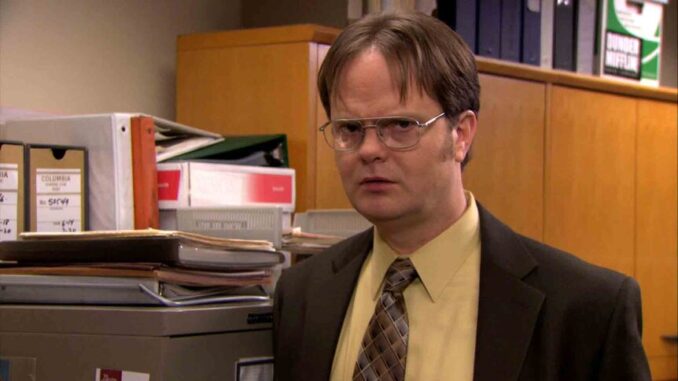
Dwight Wasn’t Crazy. He Was Just Loyal in a World That Wasn’t.
In the fluorescent-lit purgatory of Dunder Mifflin’s Scranton branch, amidst the mundanity of paper sales and the relentless absurdity of office life, one character stands as a beacon of unwavering, often bewildering, commitment: Dwight K. Schrute. To the casual observer, Dwight is a caricature of eccentricities – a beet farmer and volunteer sheriff’s deputy, obsessed with bears, Battlestar Galactica, and obscure martial arts. His social ineptitude, literal interpretations, and intense competitiveness often paint him as profoundly strange, even "crazy." Yet, beneath the mustard-colored shirts and the stern, humorless gaze lies a simple, profound truth: Dwight wasn't crazy. He was just loyal in a world that wasn't.
Dwight’s loyalty manifested first and foremost in his almost religious devotion to Dunder Mifflin and, by extension, to his perceived role within it. Unlike his colleagues, who often treated their jobs as a means to an end, a backdrop for personal drama, or simply a place to pass the time, Dwight approached his duties with a fierce, almost monastic dedication. When he orchestrated the infamous fire drill, plunging the office into chaos and panic, it wasn't the act of a madman. It was the desperate measure of a safety-conscious employee who believed, rightly, that his colleagues were dangerously unprepared for a real emergency. His subsequent CPR demonstration, complete with a terrifyingly mutilated dummy, further underscored his commitment to workplace safety and preparedness. In an office where Jim Halpert's primary contribution was pranks and Stanley Hudson's was crosswords, Dwight's intensity was an anomaly, mistaken for lunacy rather than an earnest, almost childlike purity of purpose. He truly believed in the company, in the rules, and in his ability to enforce them, even if his methods were spectacularly misguided.
But Dwight’s most profound and illustrative loyalty was reserved for Michael Scott, the regional manager who simultaneously enabled, abused, and occasionally championed him. Michael’s treatment of Dwight was often nothing short of psychological torture: endless pranks, public humiliations, and a consistent undermining of his authority. Yet, through it all, Dwight remained Michael’s unflinching right-hand man, his most fervent defender, and, astonishingly, his closest confidante. When Michael was at his most vulnerable, Dwight was there. He dutifully played along with Michael's bizarre schemes, took the fall for his misdeeds, and genuinely believed in Michael's often-delusional genius. This wasn't Stockholm Syndrome; it was a deeply ingrained respect for authority figures and a profound personal bond, however lopsided. When Michael left Dunder Mifflin, Dwight’s raw, genuine sorrow was palpable, a testament to a connection forged in the crucible of shared absurdity and Dwight’s unwavering devotion. In a world where colleagues often gossiped, backstabbed, or merely tolerated their boss, Dwight's steadfastness was an alien concept, easily dismissed as a symptom of his "craziness."
Furthermore, Dwight’s unique moral compass and personal code, often seen as further evidence of his mental peculiarities, were in fact extensions of his fierce loyalty to his upbringing and his self-prescribed principles. His agrarian roots instilled in him a deep respect for hard work, self-sufficiency, and order. His prepper tendencies, his knowledge of survival skills, and his disdain for modern conveniences weren't the ravings of a paranoiac; they were the logical conclusions of a man who believed in preparedness and self-reliance, virtues that a complacent, consumer-driven society had long forgotten. When he volunteered for the crossing guard duty, or took on the responsibilities of building manager with almost militaristic zeal, he was simply applying his intensely loyal, rule-bound nature to whatever task was before him. His "weirdness" was merely the uncompromising application of his personal credo in an environment that largely valued irony, sarcasm, and apathy.
In a world where commitment was fleeting, sincerity was suspect, and relationships were often transactional, Dwight’s intense loyalty stuck out like a sore thumb. His colleagues, conditioned to a more cynical outlook, couldn't comprehend the purity of his intentions. They interpreted his dedication as fanaticism, his literalism as stupidity, and his intensity as madness. Yet, when the chips were down, when Dunder Mifflin faced a genuine threat, or when Michael needed a true friend, it was almost always Dwight who stepped up, albeit in his own inimitable fashion.
Dwight K. Schrute was not crazy. He was a man of profound, albeit peculiar, principles, whose unwavering loyalty to his job, his mentor, and his personal code shone brightly in a corporate landscape accustomed to mediocrity and detachment. His "craziness" was merely the reflection of a world that had forgotten the value of earnest dedication, making the loyal man seem like the outlier, the one who was truly out of step. In the end, Dwight’s story reminds us that sometimes, what we perceive as madness is simply a different, more fervent, expression of devotion.
@ovriencc this has been in my drafts for over a year 😭 #fyp #foryoupagе #theoffice #theofficeus #theofficeedit #dwightschrute #dwightschruteedit #famous #makemefamous #viralvideos #trendingvideo #trendingsong